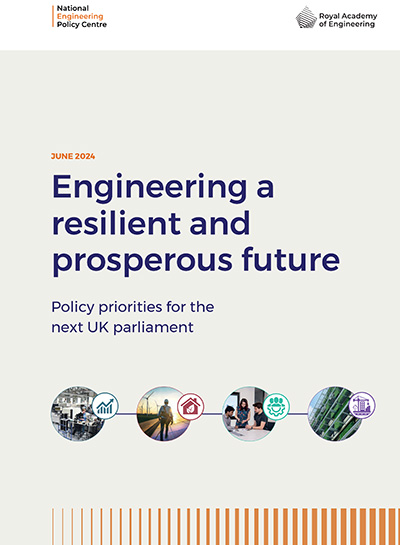Next UK government must commit to long-term industrial strategy or risk continued low economic growth, says UK engineering profession
07/06/2024
The next government must commit to a long-term industrial strategy that draws on the UK’s strength in engineering, innovation, research and manufacturing, according to a new set of policy priorities unveiled by the National Engineering Policy Centre (NEPC), led by the Royal Academy of Engineering. In ‘Engineering a resilient and prosperous future: policy priorities for the next UK parliament’[1], the engineering profession is calling for the next government to be bold and to take a holistic, long-term approach to tackling complex challenges such as climate change and slow growth, creating strong policies on which the UK can build sustainable economic growth, helping to improve people’s lives.
Engineering experts from 42 professional engineering organisations, together representing more than 700,000 engineers across the UK, have joined forces to assess the UK’s needs, which engineering can help to address, and how these are interconnected with the wider economy. Reversing persistently low economic growth is essential and involves fostering innovation, supporting small businesses and investing in strategic sectors. This will enable the UK to tackle climate change, to upgrade its ageing infrastructure and to build warm and healthy homes.
The NEPC document, directed to all political parties, outlines how engineers work to tackle complex challenges and how they can work with policymakers to best meet the UK’s needs. With engineering posts comprising nearly 20% of jobs nationally[2] and the engineering economy representing 32% of total economic output[3], it plays a vital role in UK economic growth.
 | ||
| 'Engineering a resilient and prosperous future: policy priorities for the next UK parliament' was developed by the National Engineering Policy Centre partners, led by the Royal Academy of Engineering |
In order to fully leverage the UK’s impressive engineering and technology talents, it must become a more attractive business destination, says the NEPC. The policy priorities form a package that together can help grow the economy, protect the environment and invest in the workforce and infrastructure of the future.
As well as an ambitious approach to industrial strategy, the NEPC also calls on the new government to create a framework for sustainable economic growth by taking a systems approach to policy:
- Redouble the commitment to net zero and accelerate the development and adoption of green technologies by driving action and instilling confidence through fixed targets to cut carbon emissions, incentivising demand reduction and technology development and adoption; prioritising a just transition through meaningful engagement with diverse communities; and accelerating green growth.
- Deliver a National Engineering and Technology Workforce Strategy by equipping the UK with the skilled workforce needed to meet the challenges of sustainability and technological advancement by delivering a long-term holistic plan encompassing all education stages, reskilling and upskilling, to deliver a diverse engineering and technology profession with the skills needed for the future.
- Futureproof UK infrastructure to deliver sustainable, resilient and healthy spaces by building on the National Infrastructure Assessment recommendations [4]and joining up existing subnational strategies to ensure infrastructure continues to deliver economic and societal benefits across the UK.
The start of a new parliament presents the opportunity to take a bold, long-term and holistic approach to tackling these complex challenges, says the NEPC document. It also presents an opportunity to shape the role the UK plays in the responsible development of emerging and rapidly evolving technologies, using engineering approaches to ensure that they are designed rigorously and sustainably and adopted where they have the maximum benefit.
Professor Sir Jim McDonald GBE FREng FRSE, President of the Royal Academy of Engineering, said: “Engineers are drivers of innovation and economic opportunity. They leverage advances in research to develop and deliver new products, services and enterprises that generate jobs and value to society. More than eight million people work in the UK’s engineering economy and the profession generates up to an estimated £645 billion gross value added to the economy annually. For the UK to leverage that impressive engineering and technological strength, the new government needs to pursue a clear industrial strategy, underpinned by large-scale targeted support to key sectors, as many of our competitor nations have succeeded in doing. The choice is clear: we must create an environment that supports companies here, or they will go elsewhere.”
References
- ‘Engineering a resilient and prosperous future: policy priorities for the next UK parliament’, developed by the National Engineering Policy Centre partners, led by the Royal Academy of Engineering, June 2024 (raeng.org.uk)
- 'Demand for engineers increasing, with rapid growth in green jobs', EngineeringUK, 24 May 2024 (www.engineeringuk.com)
- 'Engineering Economy and Place', Royal Academy of Engineering, 2023 (raeng.org.uk)
- 'Second National Infrastructure Assessment', National Infrastructure Committee, 2023 (https://nic.org.uk)